2021届中考复习 人教 一轮教材复习 第18讲 九年级Units 1~2课件40张
文档属性
| 名称 | 2021届中考复习 人教 一轮教材复习 第18讲 九年级Units 1~2课件40张 | 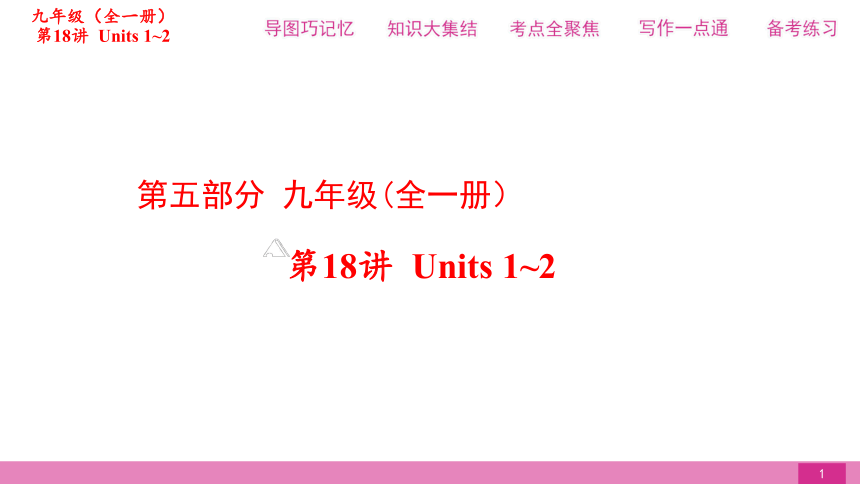 | |
| 格式 | pptx | ||
| 文件大小 | 903.7KB | ||
| 资源类型 | 教案 | ||
| 版本资源 | 人教新目标(Go for it)版 | ||
| 科目 | 英语 | ||
| 更新时间 | 2021-02-21 10:47:58 | ||
图片预览

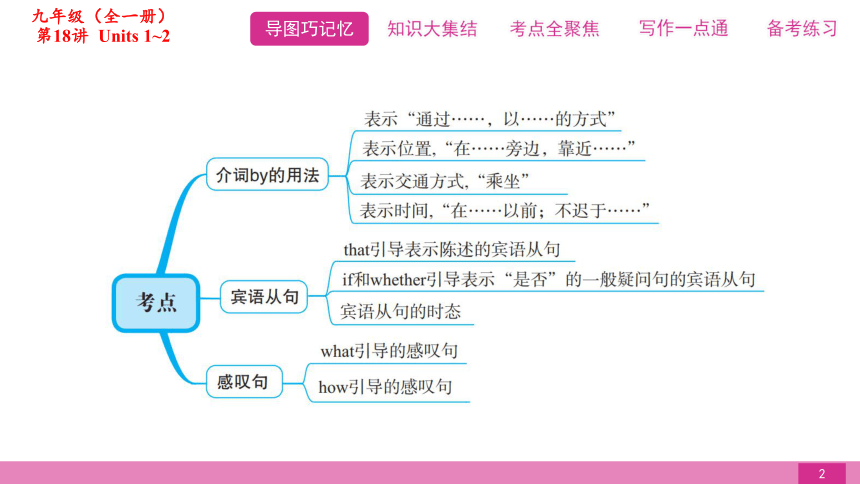
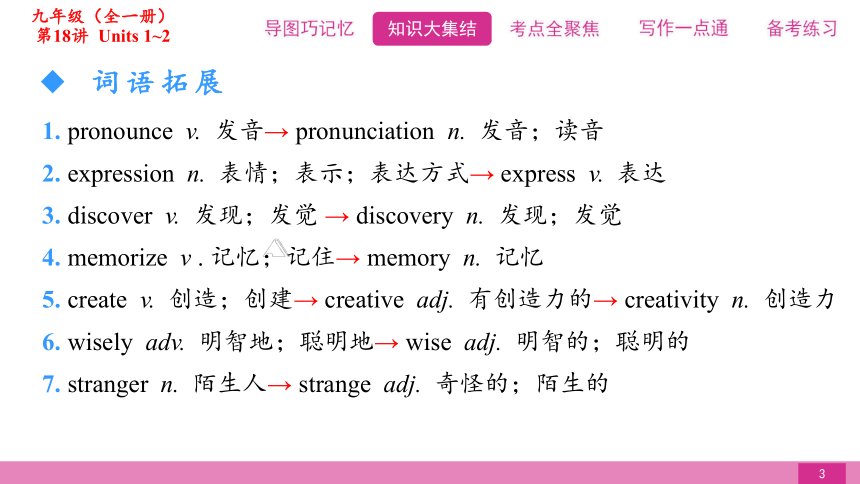
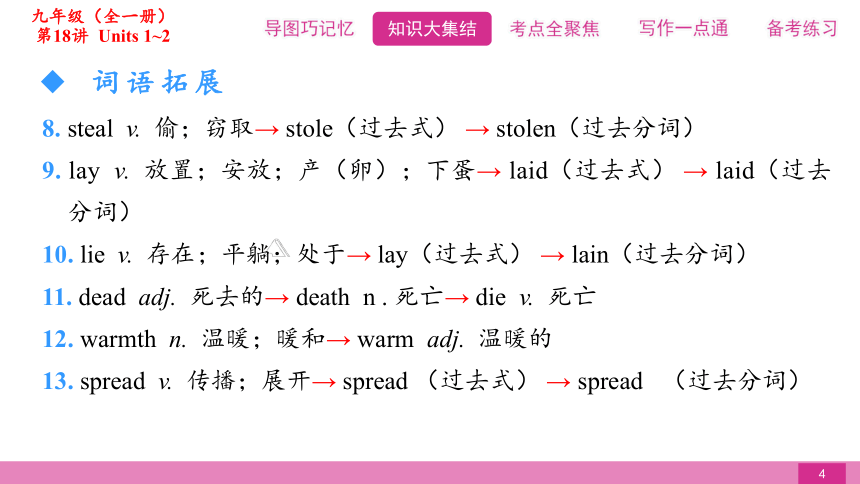
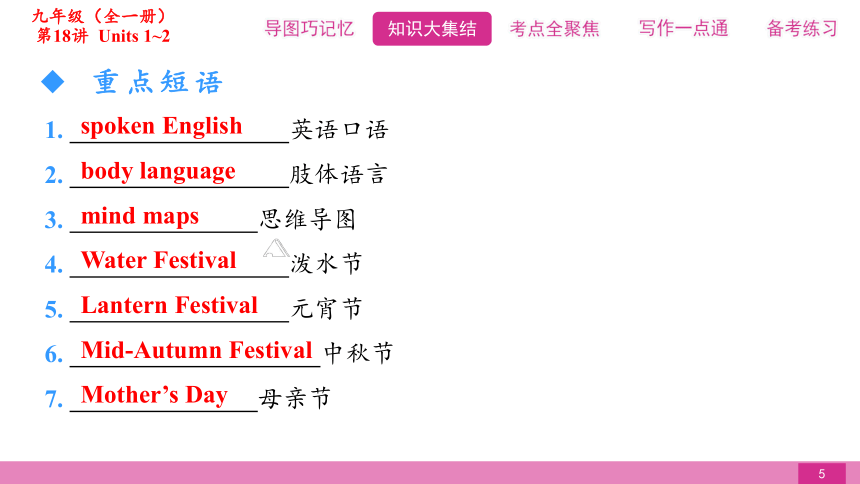
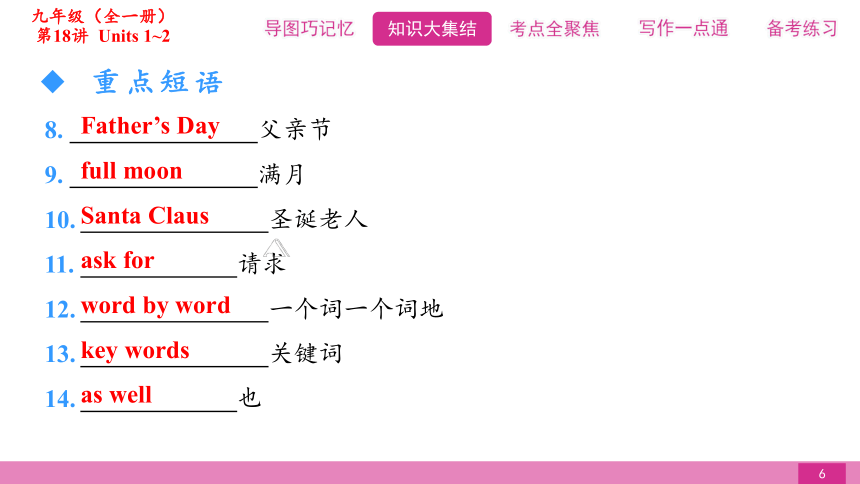
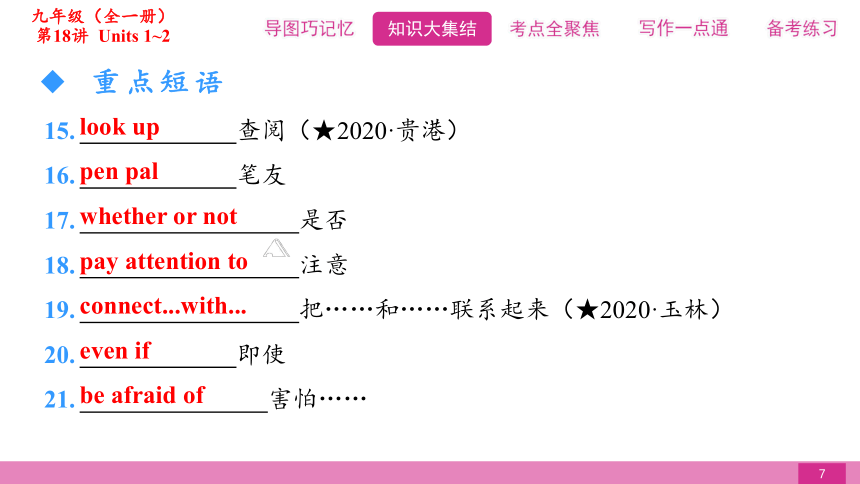
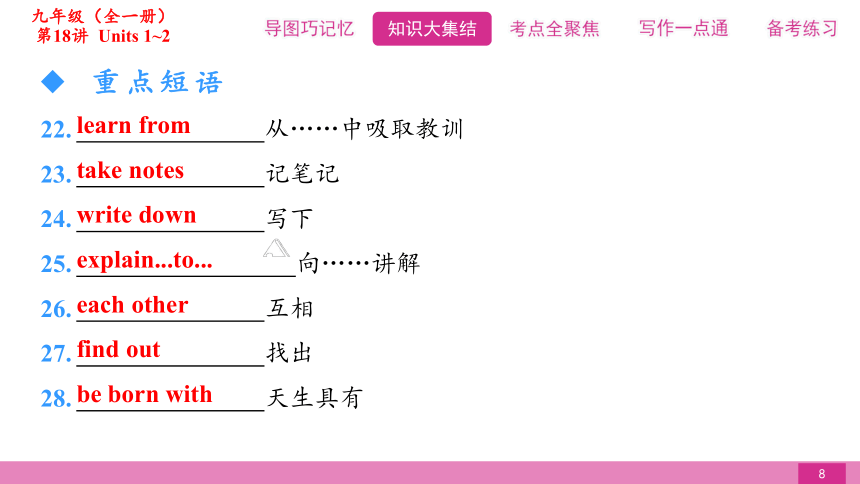
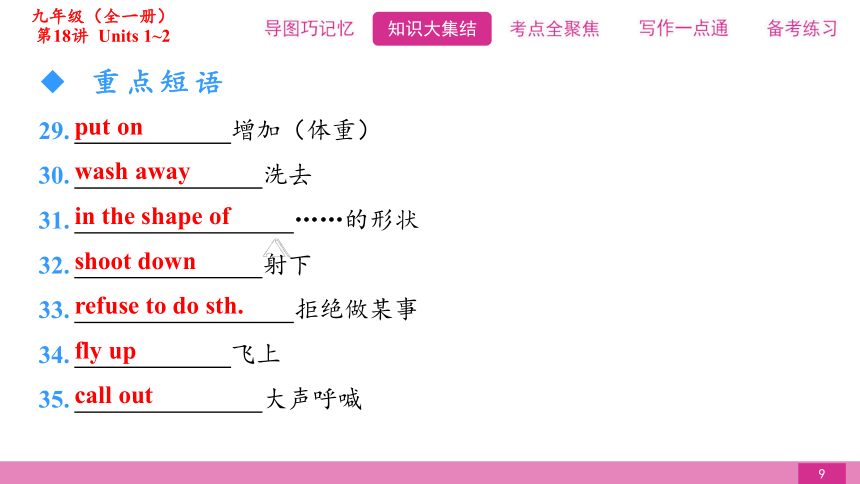
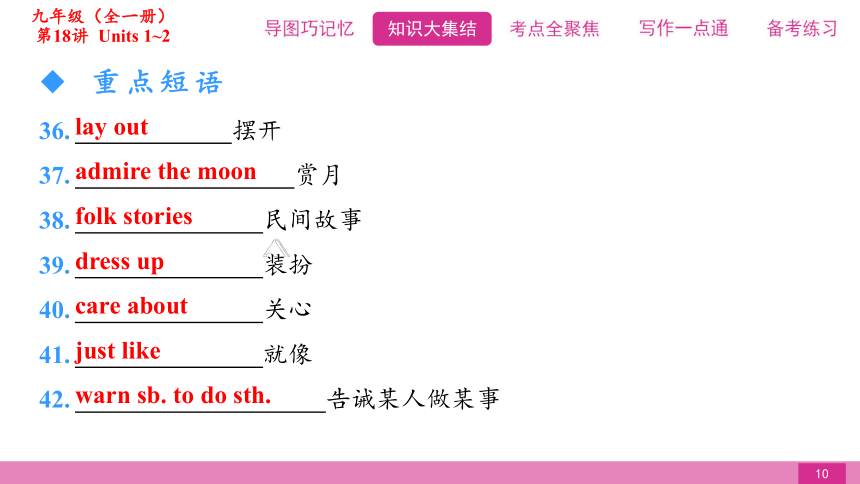

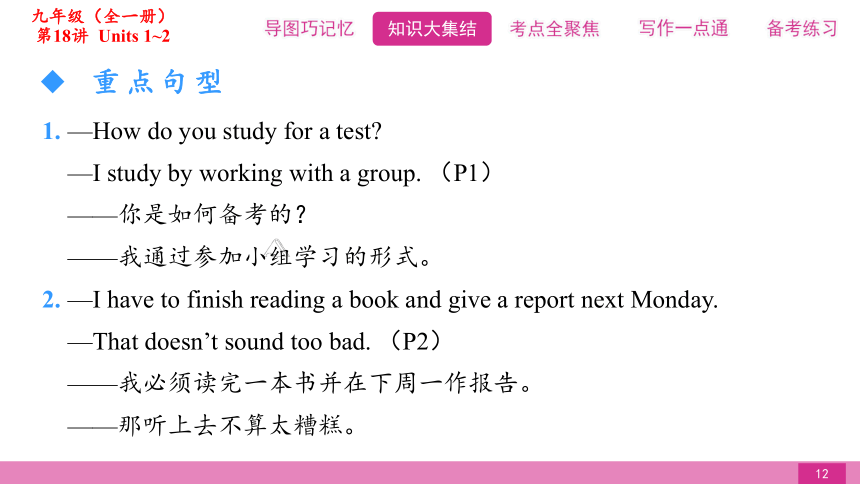
文档简介
第18讲 Units 1~2
第五部分 九年级(全一册)
1. pronounce v. 发音→ pronunciation n. 发音;读音
2. expression n. 表情;表示;表达方式→ express v. 表达
3. discover v. 发现;发觉 → discovery n. 发现;发觉
4. memorize v . 记忆;记住→ memory n. 记忆
5. create v. 创造;创建→ creative adj. 有创造力的→ creativity n. 创造力
6. wisely adv. 明智地;聪明地→ wise adj. 明智的;聪明的
7. stranger n. 陌生人→ strange adj. 奇怪的;陌生的
8. steal v. 偷;窃取→ stole(过去式) → stolen(过去分词)
9. lay v. 放置;安放;产(卵);下蛋→ laid(过去式) → laid(过去分词)
10. lie v. 存在;平躺;处于→ lay(过去式) → lain(过去分词)
11. dead adj. 死去的→ death n . 死亡→ die v. 死亡
12. warmth n. 温暖;暖和→ warm adj. 温暖的
13. spread v. 传播;展开→ spread (过去式) → spread (过去分词)
1.
英语口语
spoken English
2.
肢体语言
body language
3.
思维导图
mind maps
4.
泼水节
Water Festival
5.
元宵节
Lantern Festival
6.
中秋节
Mid-Autumn Festival
7.
母亲节
Mother’s Day
8.
父亲节
Father’s Day
9.
满月
full moon
10.
圣诞老人
Santa Claus
11.
请求
ask for
12.
一个词一个词地
word by word
13.
关键词
key words
14.
也
as well
15.
查阅(★2020·贵港)
look up
16.
笔友
pen pal
17.
是否
whether or not
18.
注意
pay attention to
19.
把……和……联系起来(★2020·玉林)
connect...with...
20.
即使
even if
21.
害怕……
be afraid of
22.
从……中吸取教训
learn from
23.
记笔记
take notes
24.
写下
write down
25.
向……讲解
explain...to...
26.
互相
each other
27.
找出
find out
28.
天生具有
be born with
29.
增加(体重)
put on
30.
洗去
wash away
31.
……的形状
in the shape of
32.
射下
shoot down
33.
拒绝做某事
refuse to do sth.
34.
飞上
fly up
35.
大声呼喊
call out
36.
摆开
lay out
37.
赏月
admire the moon
38.
民间故事
folk stories
39.
装扮
dress up
40.
关心
care about
41.
就像
just like
42.
告诫某人做某事
warn sb. to do sth.
43.
最终成为
end up
44.
使……回想起
remind of
45.
决定做某事
decide to do sth.
46.
承诺做某事
promise to do sth.
47.
有需要的
in need
1. —How do you study for a test?
—I study by working with a group. (P1)
——你是如何备考的?
——我通过参加小组学习的形式。
2. —I have to finish reading a book and give a report next Monday.
—That doesn’t sound too bad. (P2)
——我必须读完一本书并在下周一作报告。
——那听上去不算太糟糕。
3. Well, be patient. It takes time. (P2)
哦,耐心点。这得慢慢来。
4. The more you read, the faster you’ll be.(P2)
你读书越多,你读书的速度就会越快。
5. The teacher spoke so quickly that I did not understand her most of the time. (P3)
老师讲得太快了,以至于大部分时间我听不懂她讲的话。
6. I fell in love with this exciting and funny movie! (P3)
我爱上了这部既让人兴奋又有趣的电影!
7. Research shows that successful learners have some good habits in common. (P6)
研究表明,成功的学习者有一些共同的好习惯。
8. Good learners will keep practicing what they have learned, and they are not afraid of making mistakes. (P6)
好的学习者会继续练习他们已经学过的,而且他们不害怕犯错误。
9. What a great day! (P9)
多么美好的一天!
10. But I believe that April is the hottest month of the year there. (P10)
但我认为四月是那里一年中最热的月份。
11. I wonder if it’s similar to the Water Festival of the Dai people in Yunnan Province. (P10)
我想知道它是否和云南傣族的泼水节相似。
12. How delicious the food is in Hong Kong!(P12)
香港的食物真好吃!
13. He just cares about whether he can make more money and he hates Christmas. (P14)
他只关心能否赚到更多的钱财,而且他还讨厌圣诞节。
考点1 介词 by 的用法。
介词 by 可以用来表示方位、时间、手段等。
1. 表示“通过……,以……的方式”, 后面常接v.-ing 形式。例如:
I practice speaking English by joining an English-language club. 我通过加入一个英语语言俱乐部来练习讲英语。
“by + v.-ing” 结构常用来回答“How do you...?”或“How can I...?”之类的问题。例如:
—How do you learn English? 你怎样学习英语呢?
—I learn English by reading aloud. 我通过大声朗读来学英语。
2. 表示位置,意思是“在……旁边;靠近……”,有时可与 beside 互换。例如:
The children are playing by/beside the lake. 孩子们正在湖边玩。
3. 表示交通方式,意为“乘坐”,后接表示交通工具的名词或与交通工具密切相关的名词(如 air, water, land, road 等),在句中主要用作方式状语,名词前通常不用冠词或其他限定词。例如:
Jim often goes to work by bus. 吉姆常坐公共汽车上班。
4. 表示时间,意思是“在……以前;不迟于……”。 例如:
My father will come back by 7:00. 我爸爸将在七点前回来。
考点2 由 that, if, whether 引导的宾语从句。
(★2019·贺州)
在复合句中作宾语的从句叫宾语从句。连接宾语从句的主要有从属连词(that,if,whether)和特殊疑问词(what, how, where, when 等)。
1. that 引导表示陈述的宾语从句。 that 在句中只起连接作用,不充当句子成分,在非正式文体中常被省略。例如:
I hear (that) Professor Li is going to give us a talk. 我听说李教授打算给我们做一个报告。
2. if 和 whether 引导表示“是否”的一般疑问句的宾语从句。例如:
I’m not sure if / whether my brother will come back tomorrow. 我不确定哥哥明天是否会回来。
注意: if 和 whether 引导宾语从句时,一般情况下可以互换,但是当与 or not 连用时,只能用 whether。例如:
I don’t know whether Mary has arrived home or not. 我不知道玛丽是否已经到家。
3. 宾语从句的时态。
(1)如果主句是一般现在时,从句则根据具体情况用相应的时态。例如:
I wonder if / whether you’ve received my email. 我想知道你是否已经收到我的邮件了。
(2)如果主句是一般过去时,从句则只能用相应的过去时态(一般过去时、过去进行时、过去将来时、过去完成时)。例如:
I only knew she was studying in a Western country. 我只知道她在一个西方国家读书。
(3)如果宾语从句所陈述的是客观真理、自然现象、公式、定理、谚语、名人名言等,则用一般现在时。例如:
Our teacher said that light travels faster than sound. 我们老师说光比声音传播得快。
考点3 感叹句。
(★2020·玉林、2019·北部湾、2019·玉林)
感叹句是表示喜怒哀乐等强烈情感的句子,一般由 what 和 how 引导。
1. 由 what 引导的
(1)What+a/an+形容词+单数可数名词+主语+谓语! 例如:
What a fine day it is! 多好的天气啊!
(2)What+形容词+可数名词复数或不可数名词+主语+谓语! 例如:
What nice music it is! 多么美妙的音乐!
2. 由 how 引导的
(1)How+形容词(副词)+主语+谓语! 例如:
How clever the girl is! 这女孩好聪明!
How quickly the boy is writing! 这男孩写得真快!
(2)How+主语+谓语! 例如:
How time flies! 时光飞逝!
英语学习
以英语学习为主题的书面表达多以介绍学习英语的方法或经验为主要内容。
写作框架
框架1:学习方法介绍
1. 阐述英语学习的重要性;
2. 分点介绍学习方法;
3. 希望或预祝。
框架2:学习经验介绍
1. 谈英语的重要性或介绍自己学习英语的时间;
2. 介绍过去自己是怎样学习英语的;
3. 希望或预祝。
常用句型
1. English is important and useful to us.
2. English has become a bridge to the world.
3. How can we learn English well?
4. Here are my suggestions.
5. It is more than 6 years since I began to study English.
6. Practice makes perfect.
参考范文
Dear Wang Wei,
I received your email yesterday. In the email, you asked me how to improve your English. Now I’d like to give you some advice.
First, watching English films and listening to English songs are great ways to learn English! Watch and listen several times, and guess the meaning of the new words.
Second, having a conversation with a foreign teacher is also a good way. You’d better start it with greetings or a question. Also, smile before you speak and do not feel shy.
Third, write four or five words a day on pieces of paper and place them in your room. Read the words when you see them, and try to use them.
These are my suggestions. I hope they are useful to you.
Yours,
Zhang Hua
一、单项选择。
1. —I’m going to Chiang Mai in two weeks.
— .
A. Never mind. B. Sounds like fun.
C. It’s a pity. D. My pleasure.
2. —How do you study for a test?
— working with a group.
A. In B. On
C. By D. For
?
?
3. I don’t know Sandy can come to my birthday party.
A. if B. that
C. where D. who
4. I want to travel around the world and Chinese culture to other countries.
A. invite B. spread
C. make D. create
?
?
5. Schools should pay to students’ behavior as well as their mental (心理的) state.
A. attention B. money
C. effort D. time
6. Look at the sign. Reading is not allowed in the library.
A. again B. away
C. ago D. aloud
?
?
7. Summer gives us more opportunities(机会) to go outside and be .
A. shy B. lazy
C. active D. ill
8. Some people like to their illness on the Internet before going to a doctor.
A. look up B. look like
C. look after D. look down
?
?
9. The king said can save his daughter can get half of the kingdom.
A. whatever B. whoever
C. wherever D. whenever
10. beautiful the lanterns are!
A. What B. What a
C. How D. How a
?
?
二、根据中文或首字母提示,完成单词。
1. I always (欣赏) those who draw well.
2. My favorite subject is (物理).
3. I find good teachers are all the same. They are (耐心的), unselfish and nice.
4. Lucy is excited to help her cousin (发现) what colors or styles she likes best.
5. To correct his (发音),Daming practiced phonetics symbols(音标) hundreds of times.
admire
physics
patient
discover
pronunciation
6. Learn from your mistakes so you don’t (重复) them.
7. Shanghai is an important (商业) center in China.
8. Homework can help us (复习) after a day of learning.
9. Mrs. Brown has a big g with many beautiful flowers.
10. I was b in Nanning in 2003 .
11. Your k of traffic rules is very poor. I need to teach you a lesson.
12. Mother’s Day is coming. I want to buy a scarf for my mum as a p .
repeat
business
review
arden
orn
nowledge
resent
13. The train travels at a s of 350 km per hour.
14. The manager hopes his plan will help i the sales of his company.
15. They put a sign there to w people that the road was closed.
peed
ncrease
arn
三、根据句意,用括号内所给单词的正确形式填空。
1. I feel uncomfortable when a (strange) stares at me.
2. A lot of films have tried to show people’s memories of their . (die) family members.
3. I think you should learn some ways to budget (预算) your money and shop (wise).
4. When we see a new word, we can try to guess its meaning by . (read) the sentences before and after it.
5. The competition helped me improve my (speak) English.
stranger
dead
wisely
reading
spoken
四、综合填空。
The Mid-Autumn Festival is a traditional Chinese holiday. The festival falls on the 15th day of the 1. month in the Chinese lunar calendar (阴历).
The full moon stands for family reunion in Chinese tradition. Just as 2. people go back home at Christmas and Thanksgiving, families also try to get together for the Mid-Autumn Festival in China.
eighth
Western
west eat member eight look popular good write it with
As with every Chinese holiday, the Mid-Autumn Festival has 3. . own special food. People 4. it during the festival. These are small cakes 5. fillings(填充物) such as nuts, sugar and egg yolk(蛋黄). The round shape of the cake makes it 6. like the full moon.
During the day of the festival, family 7. get together and enjoy a big dinner. They sit around a table chatting while eating moon cakes and fruit. When they look up at the bright moon at night, they all express their 8. wishes for their family and ancestors.
west eat member eight look popular good write it with
its
eat
with
look
members
best
The festival inspired(激发) lots of Chinese poets to show their feelings. Many of their poems have become very 9. . For example, Su Shi of the Song Dynasty 10. Prelude to Water Melody (《水调歌头·明月几时有》) during the Mid-Autumn Festival. This classic tells the story of people who miss their families and hometowns.
west eat member eight look popular good write it with
popular
wrote
第五部分 九年级(全一册)
1. pronounce v. 发音→ pronunciation n. 发音;读音
2. expression n. 表情;表示;表达方式→ express v. 表达
3. discover v. 发现;发觉 → discovery n. 发现;发觉
4. memorize v . 记忆;记住→ memory n. 记忆
5. create v. 创造;创建→ creative adj. 有创造力的→ creativity n. 创造力
6. wisely adv. 明智地;聪明地→ wise adj. 明智的;聪明的
7. stranger n. 陌生人→ strange adj. 奇怪的;陌生的
8. steal v. 偷;窃取→ stole(过去式) → stolen(过去分词)
9. lay v. 放置;安放;产(卵);下蛋→ laid(过去式) → laid(过去分词)
10. lie v. 存在;平躺;处于→ lay(过去式) → lain(过去分词)
11. dead adj. 死去的→ death n . 死亡→ die v. 死亡
12. warmth n. 温暖;暖和→ warm adj. 温暖的
13. spread v. 传播;展开→ spread (过去式) → spread (过去分词)
1.
英语口语
spoken English
2.
肢体语言
body language
3.
思维导图
mind maps
4.
泼水节
Water Festival
5.
元宵节
Lantern Festival
6.
中秋节
Mid-Autumn Festival
7.
母亲节
Mother’s Day
8.
父亲节
Father’s Day
9.
满月
full moon
10.
圣诞老人
Santa Claus
11.
请求
ask for
12.
一个词一个词地
word by word
13.
关键词
key words
14.
也
as well
15.
查阅(★2020·贵港)
look up
16.
笔友
pen pal
17.
是否
whether or not
18.
注意
pay attention to
19.
把……和……联系起来(★2020·玉林)
connect...with...
20.
即使
even if
21.
害怕……
be afraid of
22.
从……中吸取教训
learn from
23.
记笔记
take notes
24.
写下
write down
25.
向……讲解
explain...to...
26.
互相
each other
27.
找出
find out
28.
天生具有
be born with
29.
增加(体重)
put on
30.
洗去
wash away
31.
……的形状
in the shape of
32.
射下
shoot down
33.
拒绝做某事
refuse to do sth.
34.
飞上
fly up
35.
大声呼喊
call out
36.
摆开
lay out
37.
赏月
admire the moon
38.
民间故事
folk stories
39.
装扮
dress up
40.
关心
care about
41.
就像
just like
42.
告诫某人做某事
warn sb. to do sth.
43.
最终成为
end up
44.
使……回想起
remind of
45.
决定做某事
decide to do sth.
46.
承诺做某事
promise to do sth.
47.
有需要的
in need
1. —How do you study for a test?
—I study by working with a group. (P1)
——你是如何备考的?
——我通过参加小组学习的形式。
2. —I have to finish reading a book and give a report next Monday.
—That doesn’t sound too bad. (P2)
——我必须读完一本书并在下周一作报告。
——那听上去不算太糟糕。
3. Well, be patient. It takes time. (P2)
哦,耐心点。这得慢慢来。
4. The more you read, the faster you’ll be.(P2)
你读书越多,你读书的速度就会越快。
5. The teacher spoke so quickly that I did not understand her most of the time. (P3)
老师讲得太快了,以至于大部分时间我听不懂她讲的话。
6. I fell in love with this exciting and funny movie! (P3)
我爱上了这部既让人兴奋又有趣的电影!
7. Research shows that successful learners have some good habits in common. (P6)
研究表明,成功的学习者有一些共同的好习惯。
8. Good learners will keep practicing what they have learned, and they are not afraid of making mistakes. (P6)
好的学习者会继续练习他们已经学过的,而且他们不害怕犯错误。
9. What a great day! (P9)
多么美好的一天!
10. But I believe that April is the hottest month of the year there. (P10)
但我认为四月是那里一年中最热的月份。
11. I wonder if it’s similar to the Water Festival of the Dai people in Yunnan Province. (P10)
我想知道它是否和云南傣族的泼水节相似。
12. How delicious the food is in Hong Kong!(P12)
香港的食物真好吃!
13. He just cares about whether he can make more money and he hates Christmas. (P14)
他只关心能否赚到更多的钱财,而且他还讨厌圣诞节。
考点1 介词 by 的用法。
介词 by 可以用来表示方位、时间、手段等。
1. 表示“通过……,以……的方式”, 后面常接v.-ing 形式。例如:
I practice speaking English by joining an English-language club. 我通过加入一个英语语言俱乐部来练习讲英语。
“by + v.-ing” 结构常用来回答“How do you...?”或“How can I...?”之类的问题。例如:
—How do you learn English? 你怎样学习英语呢?
—I learn English by reading aloud. 我通过大声朗读来学英语。
2. 表示位置,意思是“在……旁边;靠近……”,有时可与 beside 互换。例如:
The children are playing by/beside the lake. 孩子们正在湖边玩。
3. 表示交通方式,意为“乘坐”,后接表示交通工具的名词或与交通工具密切相关的名词(如 air, water, land, road 等),在句中主要用作方式状语,名词前通常不用冠词或其他限定词。例如:
Jim often goes to work by bus. 吉姆常坐公共汽车上班。
4. 表示时间,意思是“在……以前;不迟于……”。 例如:
My father will come back by 7:00. 我爸爸将在七点前回来。
考点2 由 that, if, whether 引导的宾语从句。
(★2019·贺州)
在复合句中作宾语的从句叫宾语从句。连接宾语从句的主要有从属连词(that,if,whether)和特殊疑问词(what, how, where, when 等)。
1. that 引导表示陈述的宾语从句。 that 在句中只起连接作用,不充当句子成分,在非正式文体中常被省略。例如:
I hear (that) Professor Li is going to give us a talk. 我听说李教授打算给我们做一个报告。
2. if 和 whether 引导表示“是否”的一般疑问句的宾语从句。例如:
I’m not sure if / whether my brother will come back tomorrow. 我不确定哥哥明天是否会回来。
注意: if 和 whether 引导宾语从句时,一般情况下可以互换,但是当与 or not 连用时,只能用 whether。例如:
I don’t know whether Mary has arrived home or not. 我不知道玛丽是否已经到家。
3. 宾语从句的时态。
(1)如果主句是一般现在时,从句则根据具体情况用相应的时态。例如:
I wonder if / whether you’ve received my email. 我想知道你是否已经收到我的邮件了。
(2)如果主句是一般过去时,从句则只能用相应的过去时态(一般过去时、过去进行时、过去将来时、过去完成时)。例如:
I only knew she was studying in a Western country. 我只知道她在一个西方国家读书。
(3)如果宾语从句所陈述的是客观真理、自然现象、公式、定理、谚语、名人名言等,则用一般现在时。例如:
Our teacher said that light travels faster than sound. 我们老师说光比声音传播得快。
考点3 感叹句。
(★2020·玉林、2019·北部湾、2019·玉林)
感叹句是表示喜怒哀乐等强烈情感的句子,一般由 what 和 how 引导。
1. 由 what 引导的
(1)What+a/an+形容词+单数可数名词+主语+谓语! 例如:
What a fine day it is! 多好的天气啊!
(2)What+形容词+可数名词复数或不可数名词+主语+谓语! 例如:
What nice music it is! 多么美妙的音乐!
2. 由 how 引导的
(1)How+形容词(副词)+主语+谓语! 例如:
How clever the girl is! 这女孩好聪明!
How quickly the boy is writing! 这男孩写得真快!
(2)How+主语+谓语! 例如:
How time flies! 时光飞逝!
英语学习
以英语学习为主题的书面表达多以介绍学习英语的方法或经验为主要内容。
写作框架
框架1:学习方法介绍
1. 阐述英语学习的重要性;
2. 分点介绍学习方法;
3. 希望或预祝。
框架2:学习经验介绍
1. 谈英语的重要性或介绍自己学习英语的时间;
2. 介绍过去自己是怎样学习英语的;
3. 希望或预祝。
常用句型
1. English is important and useful to us.
2. English has become a bridge to the world.
3. How can we learn English well?
4. Here are my suggestions.
5. It is more than 6 years since I began to study English.
6. Practice makes perfect.
参考范文
Dear Wang Wei,
I received your email yesterday. In the email, you asked me how to improve your English. Now I’d like to give you some advice.
First, watching English films and listening to English songs are great ways to learn English! Watch and listen several times, and guess the meaning of the new words.
Second, having a conversation with a foreign teacher is also a good way. You’d better start it with greetings or a question. Also, smile before you speak and do not feel shy.
Third, write four or five words a day on pieces of paper and place them in your room. Read the words when you see them, and try to use them.
These are my suggestions. I hope they are useful to you.
Yours,
Zhang Hua
一、单项选择。
1. —I’m going to Chiang Mai in two weeks.
— .
A. Never mind. B. Sounds like fun.
C. It’s a pity. D. My pleasure.
2. —How do you study for a test?
— working with a group.
A. In B. On
C. By D. For
?
?
3. I don’t know Sandy can come to my birthday party.
A. if B. that
C. where D. who
4. I want to travel around the world and Chinese culture to other countries.
A. invite B. spread
C. make D. create
?
?
5. Schools should pay to students’ behavior as well as their mental (心理的) state.
A. attention B. money
C. effort D. time
6. Look at the sign. Reading is not allowed in the library.
A. again B. away
C. ago D. aloud
?
?
7. Summer gives us more opportunities(机会) to go outside and be .
A. shy B. lazy
C. active D. ill
8. Some people like to their illness on the Internet before going to a doctor.
A. look up B. look like
C. look after D. look down
?
?
9. The king said can save his daughter can get half of the kingdom.
A. whatever B. whoever
C. wherever D. whenever
10. beautiful the lanterns are!
A. What B. What a
C. How D. How a
?
?
二、根据中文或首字母提示,完成单词。
1. I always (欣赏) those who draw well.
2. My favorite subject is (物理).
3. I find good teachers are all the same. They are (耐心的), unselfish and nice.
4. Lucy is excited to help her cousin (发现) what colors or styles she likes best.
5. To correct his (发音),Daming practiced phonetics symbols(音标) hundreds of times.
admire
physics
patient
discover
pronunciation
6. Learn from your mistakes so you don’t (重复) them.
7. Shanghai is an important (商业) center in China.
8. Homework can help us (复习) after a day of learning.
9. Mrs. Brown has a big g with many beautiful flowers.
10. I was b in Nanning in 2003 .
11. Your k of traffic rules is very poor. I need to teach you a lesson.
12. Mother’s Day is coming. I want to buy a scarf for my mum as a p .
repeat
business
review
arden
orn
nowledge
resent
13. The train travels at a s of 350 km per hour.
14. The manager hopes his plan will help i the sales of his company.
15. They put a sign there to w people that the road was closed.
peed
ncrease
arn
三、根据句意,用括号内所给单词的正确形式填空。
1. I feel uncomfortable when a (strange) stares at me.
2. A lot of films have tried to show people’s memories of their . (die) family members.
3. I think you should learn some ways to budget (预算) your money and shop (wise).
4. When we see a new word, we can try to guess its meaning by . (read) the sentences before and after it.
5. The competition helped me improve my (speak) English.
stranger
dead
wisely
reading
spoken
四、综合填空。
The Mid-Autumn Festival is a traditional Chinese holiday. The festival falls on the 15th day of the 1. month in the Chinese lunar calendar (阴历).
The full moon stands for family reunion in Chinese tradition. Just as 2. people go back home at Christmas and Thanksgiving, families also try to get together for the Mid-Autumn Festival in China.
eighth
Western
west eat member eight look popular good write it with
As with every Chinese holiday, the Mid-Autumn Festival has 3. . own special food. People 4. it during the festival. These are small cakes 5. fillings(填充物) such as nuts, sugar and egg yolk(蛋黄). The round shape of the cake makes it 6. like the full moon.
During the day of the festival, family 7. get together and enjoy a big dinner. They sit around a table chatting while eating moon cakes and fruit. When they look up at the bright moon at night, they all express their 8. wishes for their family and ancestors.
west eat member eight look popular good write it with
its
eat
with
look
members
best
The festival inspired(激发) lots of Chinese poets to show their feelings. Many of their poems have become very 9. . For example, Su Shi of the Song Dynasty 10. Prelude to Water Melody (《水调歌头·明月几时有》) during the Mid-Autumn Festival. This classic tells the story of people who miss their families and hometowns.
west eat member eight look popular good write it with
popular
wrote
